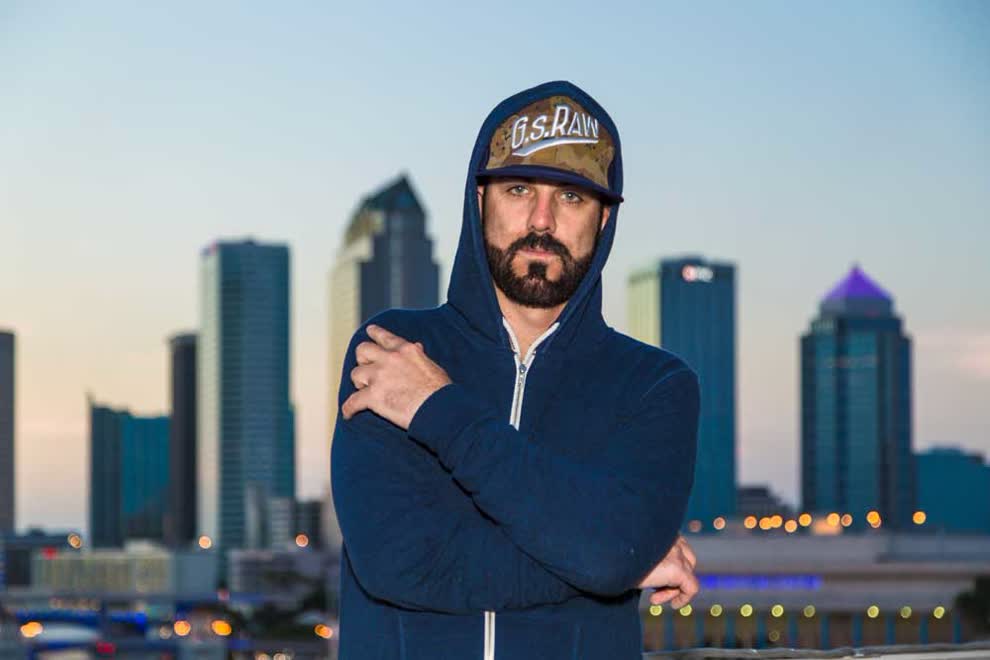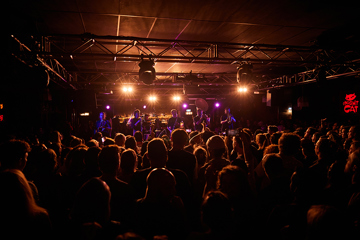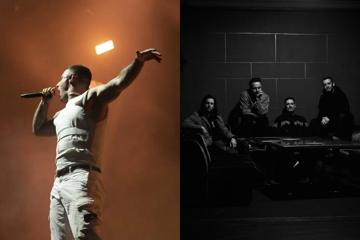Why The EDM Acronym Is Dumbed Down And Cheesy
"EDM became known for cheese — cheesy music, like big room house and everything that’s just bad."

Keith Mackenzie
Australia has long been big on breakbeat — and no city more than Perth. In the ‘90s breaks trumped house and techno to become the dominant party music — and, while the dance scene has since morphed again and again, it’s never gone away. Now one of the genre’s US legends, Keith MacKenzie, is finally hitting our shores for July’s Major Bass mini-festival with his fresh blend of booty-shaking “breaks & bass”. “I’m so excited to come to Australia,” MacKenzie announces, bright and breezy at 9am. “I’ve wanted to go for years.”
MacKenzie began DJing around Tampa, Florida, in the ‘90s. The state, traditionally famed for Miami bass over rave, was emerging as the breaks domain of the US, even the world, with Orlando’s DJ Icey as king. MacKenzie befriended his future collaborator DJ Fixx (aka Pauly Caudill). He’d produce. In 2004 MacKenzie introduced a label, illeven:eleven recordings. In the interim, the Brits gatecrashed US breakbeat, with Adam Freeland formulating his own brand of coastal (nu-skool) breaks, substituting Icey’s funkiness for prog. This led to a trans-Atlantic movement that marginalised not only the Floridians, but also their Californian cousins – DJ Dan and Überzone. The UK simply had a mightier dance music machine (and media).
“I work in the printing industry — like graphic design and printing industry. I’d got recruited by the company in Chicago."
Yet MacKenzie welcomed the newcomers. “I always loved buying UK breakbeat — ever since 1996 or whatever. But then what honestly really made me just go crazy over the new sound was when [DJ] Deekline started doing booty breaks — and that was probably 12 years ago. My daughter was born around that time, so I took maybe six months off DJing at the time. Then I got back into it — and you know how it’s just a lot of work to be involved? If you step out for just a few months, you miss a lot [laughs]. Anyway, I came back and I saw all these Deekline records and they were basically UK breakbeat mixed with booty. I was like, ‘Wow, this is next level.’ He was the first one to start doing the booty breaks stuff and then Stanton Warriors came in and started making booty breaks — and that was one of my favourite times, when the UK people started mixing booty in their music.”
Don't miss a beat with our FREE daily newsletter
MacKenzie eventually teamed with Deekline, the Londoner behind 1999’s crossover breakstep, I Don’t Smoke, for 2008’s Booty Breaks mix-CD. The American still champions a variation of booty breaks — which he touts as being like old-school breaks but, with its 808s, with a techno fervour. But he’s simultaneously mad about trap – the ‘It’ bass offshoot.
Intriguingly, MacKenzie has since left Florida for chilly Chicago (it’ll be a decade in February). It was for his career — in a sense. “Actually, I have a day job as well,” MacKenzie reveals. “I work in the printing industry [m13.com] — like graphic design and printing industry. I’d got recruited by the company in Chicago. I turned down the offer for a couple of years, ‘cause I didn’t wanna move to Chicago, but [I] finally ended up giving in — and it was the best move that I ever could have made. Chicago is amazing. I didn’t know how cool the city Chicago was.”
MacKenzie is prolific, day job or no. He continues to release solo records — and he collaborates with Caudill, alternately as ‘Keith MacKenzie & DJ Fixx’ or ‘KMFX’. The pair transformed Azealia Banks’ Chasing Time into a trap-house banger for her US$10,000 remix competition. Despite “a super great response” online, KMFX’s effort was overlooked for Amorphous’s (strange) Atmospheric Trap Remix. “I never even thought we were gonna win, but I was definitely looking and waiting for them to announce the winners – just like when you buy a lottery ticket, you look at the numbers… and then you don’t win,” MacKenzie confesses. “So anyways!”
In 2012 MacKenzie formed a studio supergroup, Smookie Illson, with Caudill and his Atlantan bestie D:RC (Darcy Reenis), premiering on Los Angeles’ post-electro Potty Mouth Music.
“It started off as just like some type of fun little experiments – and then we started making more trap and 808-based music more than breaks.” Smookie Illson unleashed a twerk bootleg rework of those Floridians Yo! Majesty’s Club Action in early 2013 — “and,” says MacKenzie, “it’s still getting played over and over again.” He reckons that “ten different people” dropped it at March’s Ultra Music Festival, including Skrillex, joined on the decks by his Jack Ü homie Diplo. “Everybody’s making their own double drop re-edits of it.” Recently, Smookie Illson issued the trapbeat Compound Riddims EP, a collab with UK jungle old-timers Ragga Twins (who, coincidentally, Skrillex has ‘rediscovered’), on Play Me Records — as well as a mixtape, Spring Training. MacKenzie hopes that Club Action’s enthusiasts check them out, too. “When you have a song like that, it just gets rinsed so hard, then you’re like, ‘Wait, we have more tunes! Hey, listen to these other tunes that we have!’ But I definitely am happy that people have supported that remix for a while.”
“When you have a song like that, it just gets rinsed so hard, then you’re like, ‘Wait, we have more tunes!'"
In addition to presiding over illeven:eleven, MacKenzie has set up Ill At Will Music – with his Smookie Illson cohorts. Plus they have an Ill At Will clothing store on Big Cartel, Reenis designing T-shirts and trucker hats. “It’s a lotta work,” MacKenzie admits of his business concerns. “There’s not enough time in the day for me to be able to do everything that I want.” The producer frets about not finishing things (he apparently has ten or so “open projects”). “It’s so frustrating!” That explains why he occasionally airs music through other “established” labels (notably Deekline’s Hot Cakes) – they’re better positioned to promote it.
Chicago (and Detroit) has seeped into MacKenzie’s later output. KMFX’s ILL City Bass EP, out on Stanton Warriors’ Punks Music, is housey – albeit like a bass reincarnation of Inner City. “Chicago has influenced a lot of the newer tunes, for sure,” MacKenzie agrees. “I feel like moving here just opened up a lotta new things for me.” He and Caudill also “rejacked” Steve “Silk” Hurley’s Chi-house classic Jack Your Body as a free download. If at one stage many a seminal Chicago house figure lamented the decline of the local circuit, in 2015 it’s buoyant — largely due to the popularity of footwork (and juke), which MacKenzie digs. “The house scene here is alive and strong,” he extols. “There’s a lotta old-school house nights that I go to from time to time. I just went to this throwback ‘80s and ‘90s house party at this huge venue called Metro — Smart Bar — and it was sold out.” Mind, MacKenzie is loyal to Florida, deeming it “awesome” — and he attends the annual Miami Winter Music Conference. Is MacKenzie nostalgic for the old days? “I’m more about the future, but I love my roots. I’m not really the person who wants to play old-school gigs. I don’t even know where I would start if someone wanted to book me at an old-school vinyl night. It’s unfortunate, but I don’t think I could do it.”
In the ‘90s mainstream America lauded ‘electronica’ (and, with it, the likes of British big beat band The Prodigy). But the bubble soon burst. The EDM boom has been different. America is forever changed: EDM is too much a part of popdom to recede. Nonetheless, MacKenzie is circumspect about the phenom. Some vets consider EDM an entry point for audiences into the underground, but he’s uncertain. In fact, MacKenzie holds that even the acronym EDM is about “dumbing it down”. “I don’t know if I’ve necessarily been a beneficiary. I still feel as though I’m an underground artist somewhat. The EDM thing, when people first started to talk about it I was like, Well, I call ‘EDM’ ‘electronic dance music’ — I call that everything. But then EDM became known for cheese — cheesy music, like big room house and everything that’s just bad [laughs]. I don’t know… I don’t feel like I’ve benefitted from that at all. But, then again, everything’s so big now — so everything is mainstream. Maybe everyone’s benefitting because the culture as a whole is blowing up.”
What impresses MacKenzie is the evolution of breakbeat. Today the amorphous music is synonymous with ‘bass’. It’s inherently an ‘anything goes’ culture, absorbing disparate genres in a way rigidly 4/4 dance music can’t, from fidget (remember that?) to dubstep to moombahton to trap — and it has subsumed myriad regional styles (among them, in MacKenzie’s case, Detroit’s otherwise neglected ghettotech). “It’s really exciting to me – ‘cause you go on the internet and you’re discovering new artists who are doing breakbeat, but don’t even know they’re doing breakbeat,” he laughs. “It’s showing that breaks are coming back in a big way. It’s not necessarily like the breaks scene, per se — I think it’s just breaks are coming into bass music. You hear some of the big people making breaks songs.” Big people like Diplo and co. And, although dubstep was rinsed to the extent that every bass DJ switched to trap, MacKenzie believes that this music won’t suffer the same fate. “Trap is here to stay — I mean, for a little while at least. If you hear some of the newer sounds some of the trap guys are making, they’re making the hybrid-sounding trap that’s like dubstep-meets-trap – like trap with a harder edge, dubstep with trap beats. Some of that stuff is pretty cool. But, yeah, I feel like breakbeat and booty are definitely on the rise.”







